Community aid organizations across the First State are bracing themselves for an influx of need when the federal emergency allotments to the Supplemental Nutrition Assistance Program (SNAP) expire at the end of February, leaving nearly 124,000 Delawareans without the extra grocery money that they’ve come to rely on for the last three years.
Other emergency relief programs started in March 2020 have already come to a close in Delaware. American Rescue Plan-funded vouchers to allow more people to temporarily stay at motels and hotels for free expired for most Delawareans at the end of August, and even more programs may end when the national public health emergency status expires in May.
But while COVID-19 based programs have gone away, the need created by the pandemic has not.
RELATED:Homelessness in Delaware continues to increase as state services, pandemic funds dwindle
“It’s going to be a challenge for those families and those households who have depended on this for the entirety of the pandemic,” said Delaware Department of Health and Social Services deputy secretary Daniel Walker.
What changes to expect with SNAP benefits
Currently, emergency allotments give SNAP recipients the maximum amount for their household size, regardless of what their typical allotment is. For example, if a four-person house usually gets $600 in benefits, they would receive the maximum of $939. Families already receiving the maximum got an additional $95 each month.
Now, some individuals will be back to getting as little as $23 a month — only 8% of what they’re used to receiving.
FOR SUBSCRIBERS:Low-income communities face toxic conditions. Delaware aims to help.
DHSS, which initially reached out to SNAP recipients in January about the end of emergency allotments, is mailing out letters in the coming days to alert people relying on the program of the upcoming change.
Walker said it’s “not lost” on DHSS that many people either aren’t aware or don’t have the time to focus on this change and what it means. He said it’s why the department has launched a social media campaign in addition to the letters and emails to get the word out.
Where else to go for help
Some states have taken the step to supplement federal SNAP benefits with their own money. However, the Delaware legislature is not debating any such measure
It’s now up to local community partners to ensure that people have enough to eat. But Food Bank of Delaware spokesperson Kim Turner said that many food pantries and non-profits are struggling on their end, too.
MORE:The COVID emergency is set to end in May. What does it mean to Delaware?

Donations are down, staffing is tight, and the same supply chain disruptions that are affecting prices and availability at the grocery store are putting a strain on food pantries. Still, Turner said the Food Bank of Delaware will do all that it can to meet what will likely be an increased need.
“We know that a lot of these people are already living on extremely tight budgets,” Turner said. “It’s going to be tough.”
Food banks aren’t the only ones expecting an influx at the end of the month.
Community Legal Aid Society, Inc. advocacy director John Whitelaw said that he and others at CLASI are “very concerned” about the ending of emergency SNAP benefits in Delaware.
“We realize that this is required by the federal government, but we think that there will be a significant increase in food insecurity amongst Delaware’s most vulnerable people,” Whitelaw said.
LOCAL:Wilmington police didn’t use a tool to combat overdose deaths. Now, they carry Narcan.
Whitelaw said he expects more calls in the coming months from people experiencing issues with their SNAP benefits. He explained that because people were previously guaranteed to get the maximum benefit amount regardless of their “regular” SNAP allotment, some people relying on the program may not have paid attention to any changes in their typical monthly allotment.

But now, with the emergency allotments taken away, that base number becomes much more crucial.
Delaware Division of Social Services director Tom Hall urged anyone whose financial situation has changed since the start of the pandemic to reach out in advance so that their SNAP allotment can be adjusted before next month.
FOOD BANK:Food Bank of Delaware is partnering with DoorDash, Amazon to deliver food to those in need
“If we can do anything with their case based on changes in their circumstances that would help them out, we want to do that,” Hall said.
Delawareans can report changes in income and household size online at assist.dhss.delaware.gov or by calling 1-866-843-7212 on weekdays between 8 a.m. and 4:30 p.m.
For other help finding food, housing or treatment, call 211 or text your ZIP code to 898-211. A live chat is available online at delaware211.org.
A list of emergency state service centers is available online at dhss.delaware.gov/dhss/dssc/ofclocations.html.
Send story tips or ideas to Hannah Edelman at hedelman@delawareonline.com. For more reporting, follow them on Twitter at @h_edelman.